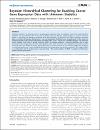Training Radial Basis Function Neural Networks for Classification via Class-Specific Clustering
Abstract
In training radial basis function neural networks (RBFNNs), the locations of Gaussian neurons are commonly determined by clustering. Training inputs can be clustered on a fully unsupervised manner (input clustering), or some supervision can be introduced, for example, by concatenating the input vectors with weighted output vectors (input-output clustering). In this paper, we propose to apply clustering separately for each class (class-specific clustering). The idea has been used in some previous works, but without evaluating the benefits of the approach. We compare the class-specific, input, and input-output clustering approaches in terms of classification performance and computational efficiency when training RBFNNs. To accomplish this objective, we apply three different clustering algorithms and conduct experiments on 25 benchmark data sets. We show that the class-specific approach significantly reduces the overall complexity of the clustering, and our experimental results demonstrate that it can also lead to a significant gain in the classification performance, especially for the networks with a relatively few Gaussian neurons. Among other applied clustering algorithms, we combine, for the first time, a dynamic evolutionary optimization method, multidimensional particle swarm optimization, and the class-specific clustering to optimize the number of cluster centroids and their locations.
Collections
- Electrical Engineering [2822 items ]
Related items
Showing items related by title, author, creator and subject.
-
Particle swarm clustering fitness evaluation with computational centroids
Raitoharju J.; Samiee K.; Kiranyaz, Mustafa Serkan; Gabbouj M. ( Elsevier B.V. , 2017 , Article)In this paper, we propose a new way to carry out fitness evaluation in dynamic Particle Swarm Clustering (PSC) with centroid-based encoding. Generally, the PSC fitness function is selected among the clustering validity ... -
A novel Conceptual Machine Learning Method using Random Conceptual Decomposition
Ali M.A.; Jaoua A.; Al-Maadeed, SomayaA. ( Institute of Electrical and Electronics Engineers Inc. , 2020 , Conference)Formal Concept Analysis (FCA) is emerging in Data Science because of its generality, simplicity, and powerful mathematical foundation. It enabled a uniform data clustering methods into structured space of formal concepts. ... -
Bayesian Hierarchical Clustering for Studying Cancer Gene Expression Data with Unknown Statistics
Sirinukunwattana, Korsuk; Savage, Richard S.; Bari, Muhammad F.; Snead, David R.J.; Rajpoot, Nasir M. ( Public Library of Science , 2013 , Article)Clustering analysis is an important tool in studying gene expression data. The Bayesian hierarchical clustering (BHC) algorithm can automatically infer the number of clusters and uses Bayesian model selection to improve ...


